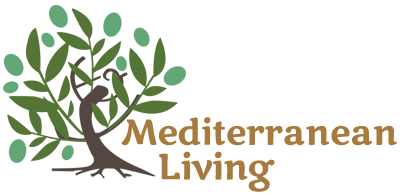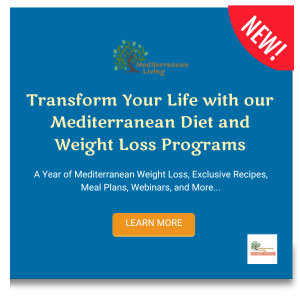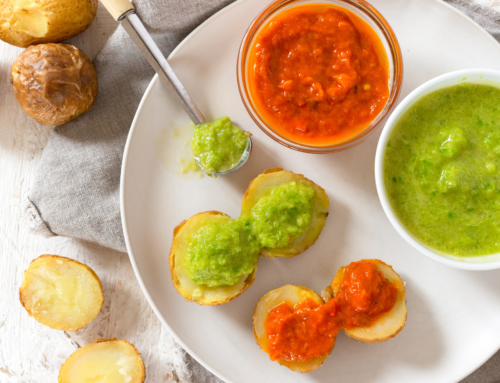Mindfulness & The Seven Dimensions of Wellness
By Christine Dutton
Updated March 30, 2023
The Seven dimensions of wellness are physical, social, intellectual, environmental, emotional, occupational and spiritual. These dimensions of wellness fit perfectly with the principles of the Mediterranean Diet and Lifestyle. By paying attention to each of these dimensions you create balance and achieve a state of wellness. Where does mindfulness fit in? Mindfulness is the umbrella over all dimensions, the act of paying attention. By dedicating clear and conscious time towards your personal growth in each of these dimensions, you will be more fulfilled. You will also experience less stress, resulting in greater health and happiness.
How can one be more present in each of the wellness dimensions?
Physical: Your body is not only your temple. It is also the foundation of your overall well-being. Addressing the needs of your body will give you the strength to develop the other dimensions. It is important to maintain your focus on your body. Listen to what it is saying to you and what it needs. This can be very difficult for some people. I personally am challenged in paying attention to my body. For people like me, who have over-active minds, it is essential to slow down and notice your body.
Let’s be clear about what your body needs. Your body needs hydration, healthy food, regular exercise, adequate sleep, a minimum amount of stress and check-ups from a doctor. It’s important to be precise in recognizing what you need to do to meet these bodily needs. Think about all of the details. How big should my portion size be? How many servings of vegetables and fruit should I eat each day? What type of exercise is best for me? All of these are crucial questions and vary by each individual body. Address the individual needs of your body in detail to become more successful in addressing your physical dimension of wellness.
Your intellectual and emotional dimensions will aide you in being mindful of your body. Register in your mind the parts of your body that could be in better condition. Some people find it very helpful to write down their goals. This practice is an excellent first step of a very practical mindfulness process. Once you have your goals in mind, you can set about to create strategies. If you break up your strategies into chunks, or “baby steps” toward a healthy body, you will find this to be more helpful for actually making changes. Implement your strategy and give yourself extra support by tracking your activities and progress.
There are many fantastic tools that you can access to help you along the way. There are phone apps, books, fitness planners, and electronic “fitness pals” that track your progress. These tools are a great investment. Companionship can aide you in meeting your goals. Invite friends to join you on your journey of making change. The buddy system is best for many people.
A final thought on mindfulness and the body: let your body just be and provide yourself with deserved rest when you need it. And, don’t forget the benefit of naps! Check out our article “The Power of The Nap” at Mediterranean Living about the real benefits of taking naps.
Social: People in some of the healthiest places in the world place a high value on closeness to family and friends. In Ikaria, the Greek island where “people forget to die,” people spend considerable time socializing, which is attributed to their overall health and longevity. There is an expression in Greek that can be translated to “living a life of Kefi (joy).” This joy is mostly found in taking time to relax, enjoying time relaxing and spending lots of quality time socializing. Studies conducted across the world have shown that being social and connecting with friends is a big predictor of overall health and longevity. If you think of being social as the last thing to check on your list, think again. I recommend you add it near the top of your list.
Being mindful in the social sphere is about recognizing socializing as a top priority for your personal health and happiness. I try to not let my work commitments and chores around the house get in the way of re-energizing and fun times with family and friends. Take a moment to think about how often you set time aside to be with others and “just be.” Do you find, that after soccer practice with the kids, work commitments and home repairs, that there isn’t time for everyone to sit down to a family meal? If so, perhaps you need some re-balancing in your life. Think about what you can say no to so you can make room for good, quality time with your family, your kids and your longtime friends. You won’t regret it!
Let us not forget that not everyone is an extrovert. Introverted folks might need a little less time in the social arena. However, everyone should create some space to connect with others. Perhaps you are better in one on one situations, in small groups and with people who you know very well. Do what feels right for you. On the other hand, extroverts should be cautious of letting their social needs overpower the other dimensions of wellness.
Intellectual: Your brain is essential in ensuring your capability of taking care of yourself, and in making good choices about your personal wellness. It is important that we pay attention to the health of our brain as well as our body. Our brain health is influenced by a variety of factors, including diet, exercise, sleep, and stress. These are all important pieces of the Mediterranean diet and lifestyle. By focusing on a healthy diet and lifestyle you improve your odds of having a healthier brain as you get older.
Studies show that people who live in the healthiest places also have a lower amount of cases of dementia. It’s funny that we sometimes can’t wrap our brain around the importance of our brain. It’s similar to our back. Sometimes we ignore the health of our back, but it collects compounding negative impacts over time. I certainly have learned that lesson!
You can be mindful about your brain by living a healthy lifestyle. You can do other practical things to contribute to your brain health, by simply keeping your brain active. Take the time to exercise your brain through mind puzzles, reading or taking classes. is power.
Environmental: You might be surprised how your environment can contribute to and take a toll on your health. Air quality, pesticides, temperature, and community safety have a big influence on your health. There are also many other outside influences that can have a big impact on the health of you and your family. Perhaps you’ve noticed articles with titles such as “Top 10 Healthy Cities” or “Best Places to Raise a Family.” We pay attention to these articles because physical environment does play an important role in our personal health.
Most of us can’t just pack up and move to the healthiest place. We don’t need to make such a move to have a positive impact on our health. One of the things recognized in the “healthy cities” was that the environments provided lots of opportunities for healthy activities, like getting outdoors. In just about any place you can make a mindful effort to seek out places that will contribute to our health. Find a local park to walk in, a mountain to climb, the nearest bike path, the swimming hole. Find any place that will expand your own environment and improve upon your health. As you may know, being in nature, breathing fresh air and gathering up some vitamin D is great for your health. Give it a try.
Your home and office are environments where you spend most of your time. So, pay special attention to those environments. Creating a sense of calm in your own personal space has a big impact on stress levels. Jumbles of mess, too much clutter and a distinct messiness can all play havoc on your stress levels. Personally, if my pantry is in disarray, I feel completely out of balance. But, it can definitely be difficult to set aside the time to get organized. I find that setting aside a specific time to tackle organizational tasks is really fruitful. The family might object, but get them involved too! And, hope for a rainy day, where the temptations of a lovely day are kept at a distance.
Emotional: The emotional dimension requires special attention. Many of us are not very aware of what is going on for us emotionally. Some of us may also be less emotionally available to others. And finally, some folks have difficulty controlling their emotions. So, there are a few aspects to look at when improving our own emotional lives.
To recognize, demonstrate and control your emotions takes some effort. I think one good starting point is to read Daniel Goleman’s book Emotional Intelligence, to gain an understanding of what an emotionally intelligent person looks like. Then you can think about how you can improve in being more emotionally intelligent. If you aren’t familiar with emotional intelligence, here is the definition: the capacity to be aware of, control, and express one’s emotions, and to handle interpersonal relationships judiciously and empathetically.
Tackling your emotions often ends up on a low priority list. This is primarily because your emotional life is the hardest thing to address. It’s emotional! But, making a concerted effort will improve upon your personal wellness. Engaging in your own emotional life can be a transformative experience.
Occupational: We spend more time working than in any other activity. And, it’s a demanding and stressful activity in just about every occupation. A certain amount of intensity and stress is acceptable and can be motivating to a lot of people. But is the level of stress in your work comfortable for you based on the rewards that you receive? It’s funny that employers expect prospective employees to focus almost exclusively on what they can bring to the company. Sure, an employee can be a treasure of talent to the organization. But, the employee won’t be around for too long without a certain level of personal reward and satisfaction.
If you’re not entirely happy with the work that you are doing, you have many options. You can have a conversation with the organization about making your position more rewarding while demonstrating that your suggestions will also be great for the employer. If you love the field you are working in, seek other opportunities in that field that will be more personally rewarding.
Finally, if you aren’t happy with your field, consider personal exploration. I highly recommend working with a life or career coach to help you to uncover your talents and interests as an assist to moving in the right direction career-wise. There are many, many amazing stories of people who make enormous shifts in their career and reap wonderful rewards. You could be one of those stories.
Timing is key in making a decision about career changes. Security and financial security are other key factors in considering a move. Be sure to consider all the factors of a shift before you make it. I’m all for making a list of pros and cons as a way to make a decision.
Spiritual: What is spirituality? One definition of spirituality is: of or relating to sacred things or matters; religious; devotional; sacred. Spirituality is also defined as a state of recognizing the sacred. Spirituality can be religious. We may also experience spirituality in sacred places or states of being. Many forms of meditation and even yoga are considered a sacred practice. Being in nature, or looking at beautiful creations such as art can be sacred for many people. Listening to or creating music can also be a spiritual experience.
Spirituality can also be found in community and recognizing how interconnected we are to each other. There is even a spiritual nature to ecology-and people are spiritually moved by understanding the interconnected web of nature.
Spirituality can infuse your being as a person, whether you practice a traditional religion, or dedicate yourself to a different way of connecting with the divine. Like the emotional dimension, finding room in your life for a spiritual practice can transform your life for the better.
As you can see, the seven dimensions of wellness can be explored in a practical way. You will become more balanced and content through conscious attention to each of the seven dimensions. Seek out knowledge and inspiration within each of the dimensions to ensure continuous personal growth. It is important to explore and grow in the dimensions without letting it become overwhelming. Your personal self-care need not be a chore or something you are checking off of a list. Let it be something that is exciting and joyful. And give yourself positive recognition for each incremental step to becoming more in balance.
Photo Credit: Christine Dutton












Bill Bradley, R.D. says:
Bill Bradley, R.D. says:
Bill Bradley, R.D. says: